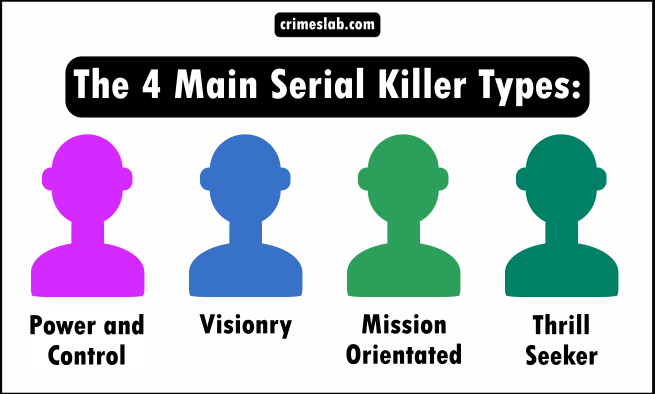Inside The Mind of A Serial Killer: What Turns A Man Into A Monster

A serial killer might not be a new word for many of us! From reading about them in newspapers to watching them in movies, people have either been fascinated or have felt deeply terrified by them. But have you ever wondered why serial killers kill? Why do some people become serial killers and most don’t? Most importantly, did you ever get a thought of what drives serial killers? These questions are not just a matter of concern for criminologists but for us too. After all, both nature (genetics) and nurture (environmental factors). While we have no control over the genetic factors, we certainly can help make the environmental factors better! So let us get into the mind of a serial killer and understand what “creates” a serial killer!
Types of Serial Killer
Before unfolding the psychology of serial killers let us understand the typologies that have been proposed by researchers. The most extensive work was done by Holmes and DeBurger. They gave four categories that help us identify the motive behind them. The four types of serial killers proposed by them are:
1. Visionary Type: They respond to delusional voices to kill certain types of people.
Real-life example: Herbert Mullin was a visionary serial killer. The paranoid schizophrenic believed that the only thing preventing California from separating from North America and sinking into the Pacific was the number of American soldiers killed in Vietnam.

source: crimeslab
2. Mission-oriented Type: They target certain groups of “evil” individuals (according to them).
Real-life example: Gary Ridgeway, known as The Green River Killer, killed nearly 50 women, most of whom were in the sex trade.
3. Hedonistic Type: These types of serial killers seek pleasure or thrills in killing
Real-life example- Jeffrey Dahmer, The Milwaukee Monster, trolled bus stops, malls, and gay bars seeking his ideal victims. These were black, gay men. He killed 17 victims by promising sex or money.
4. Power/Control Type: When serial killers want to get the power over the victims, they are considered the control type.
Real-life example: John Wayne Gacy, a successful Chicago contractor, told his wife and others that the reason for the smell in their home was moisture. It was actually 29 of his 33 victims buried within the home and property. The other four were nearby in the Des Plaines River.
Why Do Serial Killers Kill
Criminal and forensic psychologists have extensively tried to understand what drives a serial killer and they have come up with certain triggers that make a serial killer kill (again and again). Let us closely look at the suggestions of these findings.
1. Serial Killers and Role of Childhood
The relation between childhood trauma and serial killers is the most extensively studied one. Surprisingly, childhood trauma is seen as the biggest and the most common contributor to “what creates a serial killer.” In fact, most of the serial killers are found to face similar problems during childhood. They are generally the survivors of trauma be it physical, sexual, or absenteeism of parents. If you pick the biographies of serial killers you find trauma as the recurring theme!
Childhood is the formative part of our life. What is experienced by us during this time further governs who we are as a person in the near future! Therefore, feeling neglected, growing up in an abused environment, facing abuse, and lack of a discipline figure during these years of life can be the priming factor of why people become serial killers.
2. Serial Killers and Mental Health Conditions
Let us get it clear- Not everyone with a mental health condition is at the risk of being a serial killer and not every serial killer has a mental health condition. Only a few cases of serial killers have shown the signs of mental health conditions like psychosis and bipolar disorder. However, in most cases psychopathy is found to be associated with serial killers (discussed in next section).
Special mention: Anti-Social behavior or personality disorder is one of the possible indicators of why people become serial killers. However, the connection needs to be well-established through more research being conducted in the same direction!
3. Serial Killer and Psychopath
If two kids are coming from the same traumatic childhood experience or have the same mental health conditions, there is a fair chance that one of them becomes a serial killer and the other one does not! Why? Because of a factor called psychopathy. Psychopaths are identified as the ones who lack empathy, have a tendency to lie, need thrills, are narcissistic, and have a traumatic childhood. As a result they learn to compartmentalize their life (example Ted Bundy). They just learn to mask themselves and manifest what they feel is right!

4. Serial Killers and Gender
The myth that females are nurturing and sensitive beings has made people believe that all the serial killers are the male. But in reality around 15 percent of total serial killers are women! The possible reason underlying the gender and serial killers is the differences in the level of testosterone hormone. Although the link between gender and serial killer is yet to be explored.
5. Serial Killers and Intelligence
Media (especially movies!) have time and again shown that serial killers are geniuses. However, just like the other part of the population, serial killers have an average IQ level. Well, you might find a few with a high level of intelligence too but their intelligence is not found to be linked with their motives.
6. Serial Killers and the FBI Report
In the year 2005, a symposium was conducted on serial homicide, wherein FBI and field experts discussed the observations on motivations of a serial killer in detail. Some of the motives of serial killers suggested in this symposium were:
- Usually, there are multiple motives for serial killers committing their crimes.
- Motives of a serial killer can also evolve after a murder or throughout a series of homicides.
- It is tricky to identify the motive of serial killers.
- Anger is one of the most powerful motivations of a serial killer. Often they are driven by rage and hostility.
- A serial killer can be motivated to gain monetary benefits or financial gain.
- Sexual-based motivations are also found to be the driving force in many serial killers.
- To end their competitor in the criminal world so that they can enjoy a status could also trigger a serial killer. This motivation is often referred to as a criminal enterprise.
- We often say, “We are what we think!” Our ideologies do guide our actions, and serial killers are no exception to this saying. The motivation of a serial killer is likely to come from their ideology too.
- Interestingly, the concluding remarks by experts pointed out that regardless of the specific motives, most serial killers will commit crimes because they want to. Especially, in the case of the ones suffering from mental health conditions with no such coherent motive.
“Genetics loads the gun, their personality and psychology aim it, and their experiences pull the trigger” – Jim Clemente
Phases of Serial Killer
In 1988 John Norris interviewed 500 delinquents and identified the 7 phases that serial killers go through. By understanding these phases we will get answers for why serial killers kill and what triggers serial killers.
The psychology of a serial killer is an area of research that is still being explored. The more we research, the more new and unknown facts are revealed. As a society we are always looking for ways to explain the deviant behaviour but along with this we now need to work on reducing the instances of these behaviour. How? By creating a society that has less trauma and more growth to offer. Remember, the change begins from us!
Author’s Remark: I read it somewhere and I would like to share it with you that the question is not that are serial killers made or born. Our focus should be on the fact that serial killers are unmade with right parenting and healthy socialization. So make sure that you are unmaking serial killers in your surroundings by applying these two secret techniques.
If you know someone who might be at the risk of becoming a serial killer we suggest you connect them with a therapist.
Thank you for reading!




















